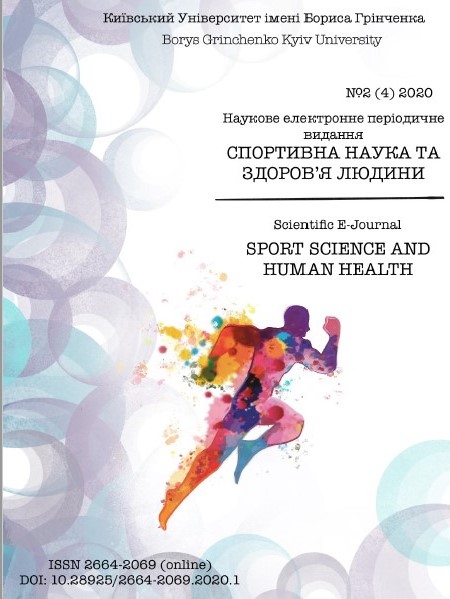PSYCHOLOGICAL TRAINING SUPPORT FOR TAEKWONDO ATHLETES IN FOUR-YEAR OLYMPIC CYCLES
DOI:
https://doi.org/10.28925/2664-2069.2020.2.10Ключові слова:
psychological training, psychological support, athletes training system, four-year Olympic cycles, competitive activityАнотація
Introduction. Psychological provision of taekwondo training in four-year Olympic training cycles. The article deals with the problems of psychological support for the training of qualified taekwondo athletes in the Olympic four-year cycles. Analyzed domestic and foreign experience on topical issues of planning and organization of the psychological and pedagogical process in the framework of various structural formations of the training process.
Aim – based on the study of special scientific and methodological literature and a survey of experts, determine the problems of psychological provision of qualified taekwondo athletes in the four-year Olympic training cycles.
Matherial and methods. Analysis of literary sources and Internet, expert survey, pedagogical observation, content analysis.
Results. In the context of intensification of competitive activity in taekwondo and an increase in the level of competition in the international sports arena, the need to improve the general system of training Olympic athletes in four-year cycles by optimizing the process of psychological provision is emphasized. Various approaches and forms of psychological provision for the training of athletes in Olympic sports have been established. The features of the psychological provision of training athletes in the framework of the process of long-term improvement are considered. It is pointed out that it is necessary to plan psychological provision for the training of taekwondo athletes in four-year cycles, taking into account the content and pedagogical tasks of specific periods of training. The importance of planning a continuous long-term work of a psychologist during the training of athletes in four-year Olympic cycles is emphasized.
Посилання
Arkania RA. Perfect for the training process of taekwondo fighters. The trajectory of science. 2016;2(7):5.14-5.33.
Voronova VI. Psychology of sport: [textbook] 3rd ed. Kyiv: Olympic Year; 2017. 271 p.
Grin OR, Voronova VI. The system of psychological support for the training of athletes as a problem of modern sports psychology. Sport bulletin Prydniprov'ya. 2015;3:29–34.
Dryukov VD. Training of highly qualified athletes in four-year Olympic cycles. Kiev: Naukoviy svit; 2002. 240 р.
Ilyin EP. Sports psychology. St. Petersburg: Peter; 2012. 352 p.
Issurin VB. Training of an athlete of the XXI century. Scientific basis and construction of training. M.: Sport; 2016. 464 p.
Lee Jong Ki. Technical and tactical characteristics of competitive sparring in the taekwondo version of the WTF [abstract]. Moscow: Russian State Academy of Physical Culture; 2003.22 p.
Lozhkin GV, Kolosov AB. From psychological assistance to psychological support of the subject of sports activity. Sports psychologist. 2012;3:5-12.
Matveev LP. General theory of sports and its applied aspects: textbook. M: Soviet sport; 2010. 340 р.
Melnikov VM, Nepopalov VN, Romanina EV. Psychological support of sports activities. M.: Jubilee collection of works of RGAFK scientists dedicated to the 80th anniversary of the Academy. 1998;3:122-9.
Piloyan RA. Motivation for sports activities. M.: Physical culture and sport; 1984.112 p.
Platonov VN. The system of training athletes in Olympic sports. General theory and its practical applications: textbook: Kiev: Olympic lit.; 2015.1 t.
Puni AC. Psychological preparation for competition in sports. M.: "Physical culture and sport"; 1969.89 р.
Suleimanov AI. Fundamentals of sports conflict management. Omsk: SibGAFK; 1997.344 p.
Anderson R. Faster, higher, psychologically stronger. Sport psychology at the London Olympic Games. InRsych. 2012 [Internet]. Available from: www.psychology.org.au/publications/ inpsych/2012/
Bompa T, Haff GG. Periodization: theory and methodology of training. [5th ed.]. Champaign IL: Human Kinetics; 2009. 480 p.
Blumenstein B, Lidor R. The road to the Olympic Games. A four years psychological preparation program. Athletic Insight [Internet]. 2007;9(4). Available from: http://www.athleticinsight.com/.
Estevan I, Álvarez O, Castillo I. Perceived self-efficacy and technical-tactical performance in university taekwondists. Cuad. Psicol. Deporte. 2016;16:51–64.
García-Naveira A. Optimism, general self-efficacy and competitiveness in young high-performance athletes. Cult. Cienc. Deporte. 2018;37:71–81.
Harbert R. The psychology of being Olympic Favorite. Athletic Insight [Internet]. 2007;9(4). Available from: http://www.athleticinsight.com.
Horska H. Psychological support for the preparation of athletes for the Olympic Games. Science in Olympic Sport. 2019;4:41-5.
Kristjánsdóttir H, Erlingsdóttir AV, Sveinsson G, Saavedra JM. Psychological skills, mental toughness and anxiety in elite handball players. Pers. Indiv. Differ. 2018;134:125–130.
Mehdipoor-Keikha B, Yusof S, Jourkesh M. The relationship between pre-competition state anxiety components and mood state sub-scales scores and the result of among college athletes through temporal patterning. Int. J. Sport Sci. 2015;5:8–15.
Ortenburger D, Wąsik J, Bukova A. Taekwondo training in the context of dealing with negative emotions. Archives of Budo Science of Martial Arts and Extreme Sports. 2015;11:99-104.
Rodionov АV. Psychology of physical education and sport: textbook for students of physical culture profile institutions. Мoscow. Аkademicheskiy proyekt; Fond «Мir»; 2004. 576 p.
Sabina M, Ioana-Sorina L, Elena-Andreea L. Manifestations of Some Personality Traits in Karate Do. ProcediaSocial and Behavioral Sciences. 2014;117:269-274.
Sonesson S, Kvist J, Ardern C, Österberg A, Silbernagel KG. Psychological factors are important to return to pre-injury sport activity after anterior cruciate ligament reconstruction: Expect and motivate to satisfy. Knee Surg. Sports Traumatol. Arthrosc. 2017;25:1375–1384.
Sotoodeh MS, Talebi R, Hemayattalab R, Arabameri E. Comparison of selected mental skills between elite and nonelite male and female Taekwondo athletes. World Journal of Sport Sciences. 2012;6(1):32-8.
Vysochina N. Psychological support in long-term preparation of athletes. Sporto mokslas. 2016;4(86):2–9.
Vysochina N, Vorobiova A, Vasylenko M, Vysochin F. Volitional qualities of athletes and their influence on competitive activities. Journal of Physical Education and Sport. 2018;18(1):230–4.
Wylleman P. An organizational perspective on applied sport psychology in elite sport. Psychology of sport and exercise. 2019;42:89-9.
Yancheva T. Psychological problems in modern sport. Science in Olympic Sport. 2020; :71-5. DOI:10.32652/olympic2020.1_6
##submission.downloads##
Опубліковано
Як цитувати
Номер
Розділ
Ліцензія
Авторське право (c) 2021 Спортивна наука та здоров'я людини

Ця робота ліцензується відповідно до Creative Commons Attribution-NonCommercial-NoDerivatives 4.0 International License.











